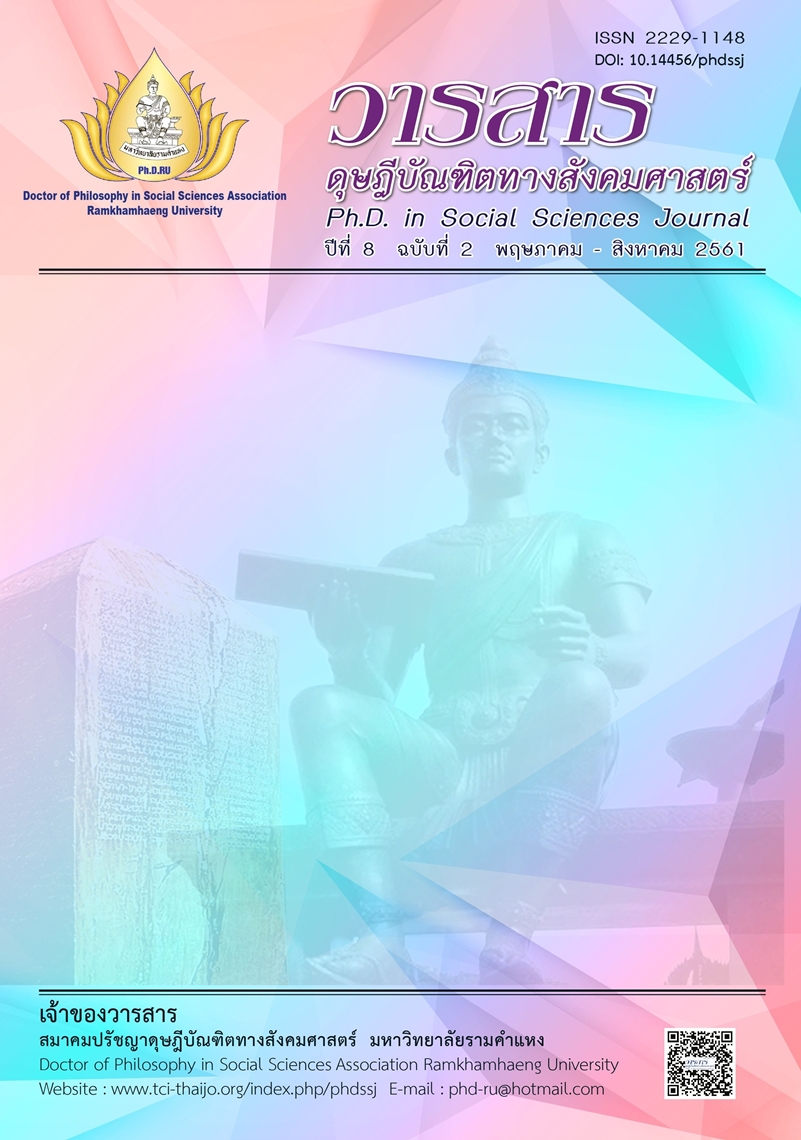SUCCESS LESSON OF SAMPRAN MODEL
Main Article Content
Abstract
This study aims to study activities of the Sampran Model project, problems, and obstacles of the activities and to investigate lessons learned of the project in social, economic, and environmental dimensions and to propose guidelines to promote and improve the projects. Interviews to the Managing Director of the Sampran Riverside Hotel and eleven farmers’ representatives. The activities in the project include such as the Sookjai market and the Sookjai Sunjorn market which the farmers sell organic products and Sookjai Organic Community Enterprise, etc.
The problems and obstacles of the project are that farmers still have gotten used to the traditional way of using chemicals in agriculture and seed for organic farming has been shortage. In addition, farmers lack of knowledge, such as postharvest management, marketing, etc. And some of the organic yields are abundant, resulting in overcapacity. Moreover, consumers still lack knowledge about organic agriculture and some of them get used to eat beautiful products. Lessons learned in a social dimension involve a network between consumers, farmers, agencies, and educational institutions. For economy dimension, farmers income and marketing channels has increased and for environmental dimension, farmers reduce chemicals in agriculture, restoring soil quality and surrounding environment and use existing resources for maximum benefit and seed preservation. The development and promotion guidelines of Sampran Model project. Include e.g. supports marketing channels and organic certification, government and educational institutions support knowledge and budget, organize activities for consumers to visit farmers, and Sookjai Organic Community Enterprise support overflowing production, etc.
Article Details
Academic articles, research articles, and book reviews in the Ph.D. in Social Sciences Journal are author’s opinions, and not the publisher’s, and is not the responsibility of the Ph.D. in Social Sciences Journal Philosophy Association, Ramkhamhaeng University. (In the case that research is done on human, the researcher has to be trained in Ethics for Doing Research on Human Training and has to produce the evidence of the training).
References
เกษตรอินทรีย์บ้านแสนรักษ์. (2557). การจัดการระบบการผลิตพืชผักอินทรีย์. ค้นวันที่ 18 กุมภาพันธ์ 2560 จาก http://resource.thaihealth.or.th/library/hot/14623
กรีนเนท. (ม.ป.ป.). ระบบชุมชนรับรอง PGS การรับรองแบบมีส่วนร่วม. ค้นวันที่ 20 กุมภาพันธ์ 2560 จาก http://www.greennet.or.th/article/1138
นงลักษณ์ จิ๋วจู, ทิพย์วรรณ ศิบุญนันท์, อนุ ธัยชะพงษ์, ชญาน์นันท์ ศิริกิจเสถียร , ชูเกียรติ เนื้อไม้, และประพัสสร บัวเผื่อน. (2558). การถอดบทเรียนความสำเร็จ การเป็นชุมชนต้นแบบด้านเศรษฐกิจพอเพียงเพื่อนำมา พัฒนาชุมชนบ้านวังน้ำแดง หมู่ที่ 5 ตำบลท่ามะเขือ อำเภอคลองขลุง จังหวัดกำแพงเพชร (รายงานผลการวิจัย). กำแพงเพชร: มหาวิทยาลัยราชภัฏกำแพงเพชร.
พรสวรรค์ พันธ์ภักดี, จุฑามาศ สุนทร, ภัทราพร ภาระนาค, และนันทพัทธ์ โนนศรีเมือง. (2557). การศึกษา เบื้องต้นเพื่อหาแนวทางการส่งเสริมและพัฒนาศักยภาพตามปรัชญาเศรษฐกิจพอเพียง ของนิคมเศรษฐกิจพอเพียง (บ้านสะอาดสมศรี) (รายงานผลการวิจัย). กาฬสินธุ์: มหาวิทยาลัยเทคโนโลยีราชมงคลอีสาน.
มูลนิธิสังคมสุขใจ. (ม.ป.ป.). โครงการสามพรานโมเดล. ค้นวันที่ 21 มีนาคม 2560 จาก http://sampranmodel.com/
วรางคณา จันทร์คง. (2557). การถอดบทเรียนตอนที่ 1. จุลสารสาขาวิชาวิทยาศาสตร์สุขภาพออนไลน์. (1).
วิสาขา ภู่จินดา และสิริสุดา หนูทิมทอง. (2557). การจัดการสิ่งแวดล้อมชุมชนเมืองและชุมชนชนบทโดยหลักปรัชญาของเศรษฐกิจพอเพียง. วารสารมนุษยศาสตร์และสังคมศาสตร์ มหาวิทยาลัยมหาสารคาม, 33(6), 110-122.
สำนักระบาดวิทยา. (2559). สรุปรายงานการเฝ้าระวังโรค ประจำปี 2558. ค้นวันที่ 15 มกราคม 2560 จาก http://www.boe.moph.go.th/Annual/AESR2015/
อานัฐ ตันโช. (2549). เกษตรกรรมธรรมชาติประยุกต์. กรุงเทพมหานคร: สำนักงานพัฒนาวิทยาศาสตร์และเทคโนโลยีแห่งชาติ.
อาภาวรรณ โสภณธรรมรักษ์. (2560). เรียน-รู้-รื่นรมย์ วิถีอินทรีย์ใจกลางกรุง. ค้นวันที่ 23 กันยายน 2560 จาก http://www.thaihealth.or.th/partnership/Content/38417-เรียน-รู้-รื่นรมย์ วิถีอินทรีย์ใจกลางกรุง.html

